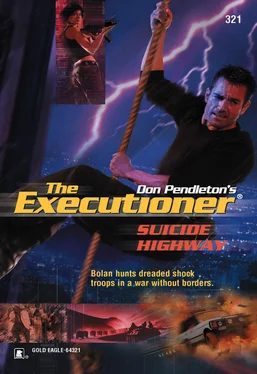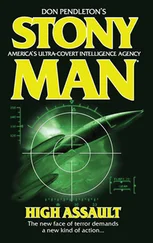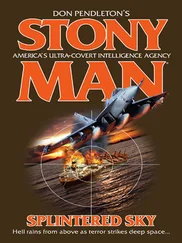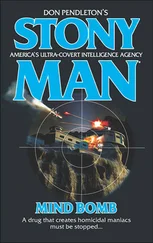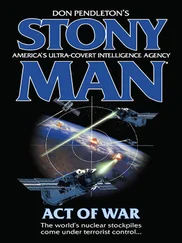Bolan dropped back, dazed. The rifle slashed out again. The soldier brought up his left hand to block the next chop and felt his forearm go numb. The Chinese pistol sailed from his grasp.
The Executioner wasn’t standing still. He kicked the guy in the knee, a dead center blow struck with his steel-toed combat boots. With a cry, the rifleman staggered, letting go of his weapon and windmilling his arms to maintain his balance. Bolan didn’t allow him any mercy, launching two right jabs with pistonlike speed. The Taliban fighter’s nose exploded, rivers of blood streaming down into his mustache and beard. Another step forward, and Bolan folded his opponent over his knee. A hammering fist dropped savagely on the back of the thug’s head and with a savage twist, Bolan hurled the half-conscious man over his hip.
“Give up,” Bolan said, picking up the sand-covered .44 Magnum pistol. He aimed the tunnellike barrel at the militiaman’s nose.
Eyes wide, the man muttered what sounded like gibberish to Bolan’s ears, and passed out.
Bolan lowered the Taurus, then brought his fingers to his swollen cheek, tears welling in his eyes from the sting.
“Striker!” he heard Tera Geren shout. He looked up and saw her running toward him alongside Laith and two big guys in nomex jumpsuits and boonie hats.
“That’s Colonel Brandon Stone,” Bolan told her.
Geren paused, looking at her allies, then presented her hand. “Theresa Rosenberg.”
Bolan nodded. “And your friends?”
“Staff Sergeants Wesley and Montenegro,” Geren answered. “U.S. Special Forces.”
“Green Berets?” Laith asked.
“Yeah,” Wesley said apprehensively, while Montenegro simply nodded. “You don’t dress like a local.”
“To prevent friendly fire, soldier,” Bolan explained. “He’s my guide.”
“Uh-huh,” Wesley said. “And what’s he guiding you to?”
“All the hottest tourist traps on the map,” Bolan said.
“Tourist traps?” Laith asked. “Oh, Colonel Stone, I’m sorry. I thought you said terrorist traps.” He shook his head. “English is only my second language.”
Bolan rested a hand on Laith’s shoulder. “It was an honest mistake, though I can see now why you suggested bringing a .44 Magnum along to pick up girls.”
Laith shrugged and turned to face the others. “Well, if you don’t mind, we’ll be off.”
Bolan saw Geren struggling to control her laughter, but the Special Forces sergeants weren’t buying it. “We’re taking these men for interrogation,” Wesley said, pointing to the surviving Taliban fighters.
“We were supposed to be snooping and pooping on these creeps,” he explained. “You interfered with that.”
“And what are you doing here?” Bolan asked Geren.
“Protecting truth, justice and a really good kosher pickle,” she replied.
Yeah, Bolan thought. Tera Geren was still a red-hot firecracker.
“Thanks for the update,” Bolan said.
“Let’s not waste a valuable intelligence opportunity,” Geren told Wesley. “We’ve captured people who might lead us to the UN hit.”
“You’re working this too?” Bolan asked.
Geren glanced up at him. “We have to talk, Colonel,” she said stiffly.
Bolan remained silent, answering with only a nod. The atmosphere drained of whatever relief he’d felt at the sight of a familiar ally.
He dismissed his disappointment at being at cross-purposes with Geren. It was an occupational hazard that he’d faced before, all too often. When working with someone who was loyal to and spilled blood for the safety of the land of her birth, there was always the possibility that the people in the field could end up flipping from friends to enemies.
And even if they weren’t enemies, they’d still end up doing their own thing.
A situation like that could get people killed.
MARID HAYTHAM KNEW the woman on sight. She was a member of the Israel’s secret police—one of the accursed enemies who hunted down his allies relentlessly. She was good, but she usually worked alone, almost as if she were a sacrificial lamb no one wanted to be associated with. Some wondered if it was because she was a woman who dared to take on the duties of a man, but Haytham knew better.
Women were present in all levels of Israel’s military. The country was in such a besieged state that women’s liberation was a nonissue, even in the 1950s. If you had two arms and two legs, you were able to fight for your country.
Tera Geren was not very tall, but she had a robust build, probably padded out by the body armor she wore. Still, it presented her as someone substantial.
Haytham was tempted to raise his AK-47, rest the barrel on the door of his car and hold down the trigger, stitching her from crotch to throat, but for once, he was reluctant to take out his fury on a known Jewish agent.
For one part, she had a reputation of not being a hard case who targeted bystanders. Because she worked as a lone wolf, she spent a lot of time alone among Palestinian and non-Palestinian Arabs who lived in Israel. Both groups seemed to consider her, grudgingly, as someone who was sympathetic to their desires to live in peace on land that they owned. She came down hard only on enemies who had killed, and who could fight back.
For the second part, he and his team were in Afghanistan to look for the same men she was seeking.
It was one thing for Israel to launch rockets into Palestinian towns. It was another for them to send in men to slaughter the children and wives of freedom fighters as if they were no more than dogs.
Haytham had his orders.
The men who were responsible for the deaths in the Shafeeq Refugee camp had to die. The blood of brothers, sisters, wives, sons, daughters, nieces and nephews had been spilled by merciless fusillades of bullets. The camp of compassion and tenderness had been turned into an abbatoir by cowardly men who had swooped down on the unarmed, the sick and the starving.
Haytham wanted to pull the trigger and wipe out the Jewish woman, but he knew that for now, she was an ally in that she would have a better chance of tracking down the killers. She had contacts, she knew about hideouts and she would be relentless, if the orders that were intercepted were true.
Haytham frowned.
He hated to admit that the Mossad would actually be interested in hunting down the men he had been ordered to kill. It meant that there were Jews who were actually interested in justice, even for the families of their sworn enemies.
It happened every so often—these moments of doubt. In the young fighter his superiors saw a powerful warrior ready to burst free, but one who was not willing to fight recklessly in the street. Instead of supervising a suicide bombing, he was more likely to be involved in direct conflict with armed Israeli troops.
Hamas needed all types of fighters. As long as Haytham’s dedication was unflinching when it came to facing enemy soldiers, then he had a task.
He was seeking justice against a band of savage killers.
He watched as others assembled around Geren. American soldiers, heavily armed and capable of wiping him out if they detected him, flanked her. They kept the muzzles of their rifles aimed at the ground, but their eyes swept the street as others came out to greet them. Two more men, one an Afghan, the other a tall, lean, grim soldier dressed in black, joined Geren and the American Special Forces troops.
On the street, there were easily a dozen people, all but Geren, the tall wraith in black and the Afghan were toting rifles and handguns. Whatever opportunity Haytham had had to strike a blow against the Israelis and America was gone. Twelve bodies were too many even for the 30-round magazine of anAK-47 on full-auto. He’d cause at least one or two deaths, and several injuries, but the others would dive for cover.
Читать дальше
